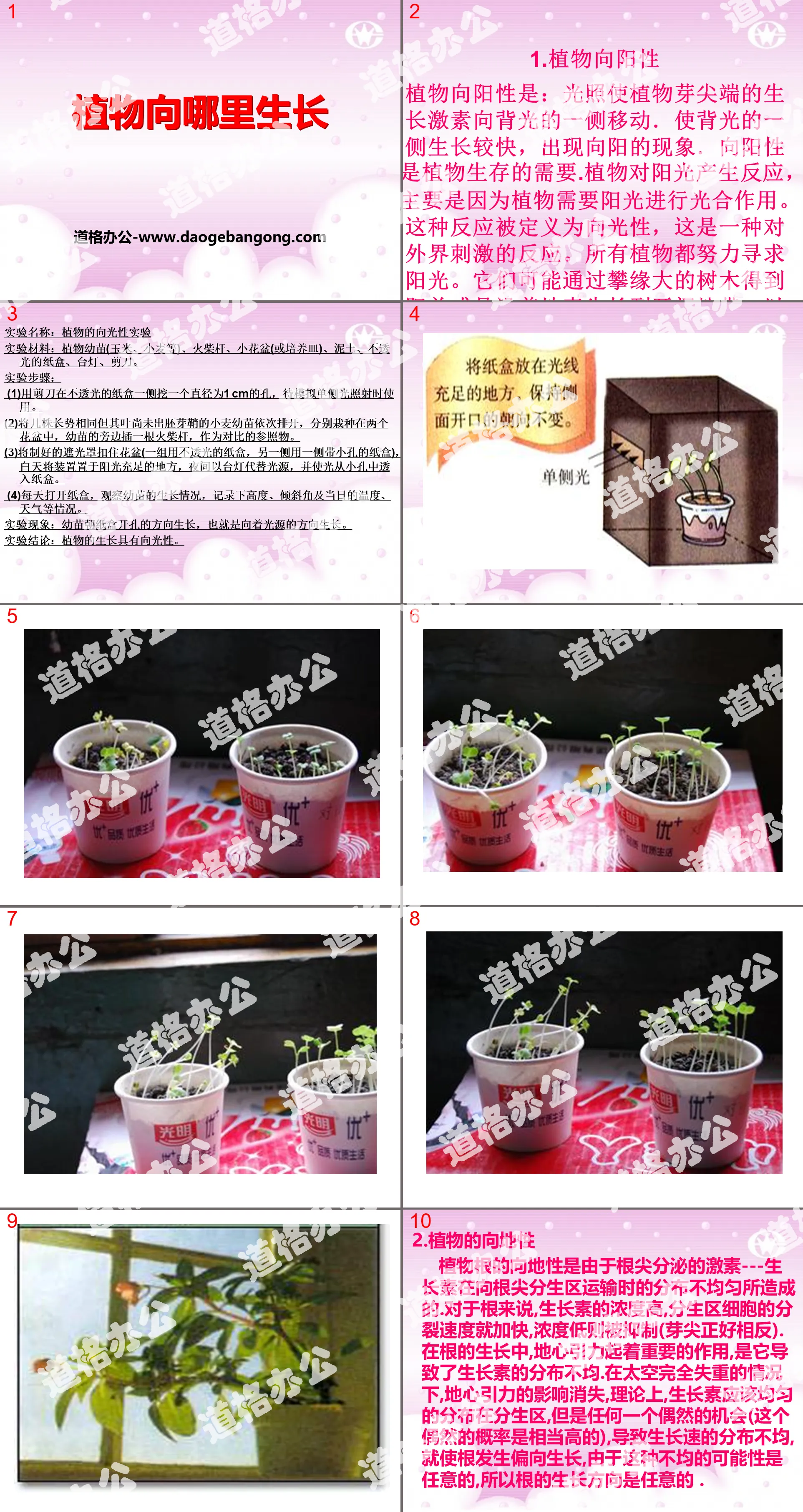Fifth Grade Science Volume 1, Textbook Edition
Science Edition for Sixth Grade Science Volume 2
Science Edition for Sixth Grade Science Volume 1
Third Grade Science Volume 2, Textbook Edition
Fourth Grade Science Volume 2, Textbook Edition
Fourth Grade Science Volume 1, Textbook Edition
Third Grade Science Volume 1, Textbook Edition
Fourth-grade science volume 2 of the E-education edition
Qingdao Edition Fourth Grade Science Volume 2
Hunan Education Edition Fourth Grade Science Volume 1
E-education edition fifth grade science volume 1
E-education edition fifth grade science volume 2
Fifth Grade Science Volume 2, Textbook Edition
E-education edition sixth grade science volume 1
Zhejiang Education Edition Seventh Grade Science Volume 2
People's Education Press Fifth Grade Science Volume 2

| Category | Format | Size |
|---|---|---|
| Qingdao Edition Fourth Grade Science Volume 2 | pptx | 6 MB |
Description
"Where do plants grow" PPT
Part 1: Plants move toward the positive
Plants move toward the positive side: light causes the growth hormone at the tip of the plant bud to move to the backlight side. Make the backlit side grow faster and appear facing the sun. Positive orientation is a need for plants to survive. Plants respond to sunlight mainly because plants need sunlight for photosynthesis. This reaction is defined as phototropism, which is a response to external stimuli. All plants strive for sunlight. They may get sunlight by climbing large trees or growing along the ground into open areas to get enough sunlight. The more sunlight there is, the better the plants will grow.
Experiment name: Plant phototropism experiment
Experimental materials: plant seedlings (corn, wheat, etc.), matchsticks, small flowerpots (or petri dishes), soil, opaque paper boxes, desk lamps, and scissors.
Experimental steps:
(1) Use scissors to dig a hole with a diameter of 1 cm on one side of the opaque carton for use when simulating unilateral light exposure.
(2) Arrange several wheat seedlings with the same growth potential but whose leaves have not yet emerged from the coleoptile, and plant them in two flower pots respectively. A matchstick is inserted next to the seedlings as a reference for comparison.
(3) Fasten the prepared light shields to the flower pots (one group uses an opaque paper box, and the other side uses a paper box with a small hole on one side). Place the device in a sunny place during the day and use it at night. The desk lamp replaces the light source and allows the light to penetrate through the small holes into the cardboard box.
(4) Open the carton every day, observe the growth of the seedlings, and record the height, tilt angle, temperature, weather, etc. of the day.
Experimental phenomenon: The seedlings grow in the direction of the opening of the carton, that is, in the direction of the light source.
Experimental conclusion: Plant growth is phototropic.
Where do plants grow PPT, Part 2: Geotropism of plants
The gravitropism of plant roots is caused by the uneven distribution of auxin, a hormone secreted from the root tip, when transported to the root apical meristematic zone. For roots, the concentration of auxin is high and the cells in the meristematic zone are The division speed is accelerated, and the low concentration is inhibited (the opposite is true for the shoot tip). In the growth of roots, gravity plays an important role, which leads to uneven distribution of auxin. In the case of complete weightlessness in space , the influence of gravity disappears. Theoretically, auxin should be evenly distributed in the meristematic zone, but any chance (the probability of this chance is quite high) leads to uneven distribution of growth rate, which will cause the roots to Biased growth occurs, and since the possibility of this unevenness is arbitrary, the direction of root growth is arbitrary.
where do plant roots grow
Experimental materials----------records.
Experimental phenomenon: The roots of the four corn seeds all grow toward the ground.
Experimental conclusion: Plant growth is geotropic.
PPT on where plants grow, part three: tropic movement of plants
Exchange research results and understand sex-oriented movements
Through comparative experiments, it is concluded based on the research results that the above-mentioned phenomena affecting plant growth are indeed related to sunlight, water and earth's gravity. That is: the phototropism, geotropism and hydrotropism of plants are the growth responses of plants.
(Write on the blackboard: phototropism, geotropism, hydrotropism,)
What is phototropism? Geotropism? Obesity? Hydrotropism?
What is tropism of plants?
The "head" of a sunflower will rotate as the position of the sun changes. This growth bending phenomenon caused by light stimulation is called phototropism.
The phenomenon of plant roots growing underground is called geotropism. The roots of plants also have several growth reactions; they grow towards fertile places, which is fertilization; in dry soil, roots will also grow towards water, which is water tropism.
Phototropism, geotropism, fertilization and hydrotropism are collectively referred to as the tropic movement of plants.
Where do plants grow PPT, Part 4: Conclusion
Based on the research results, it is concluded that the above phenomena affecting plant growth are indeed related to sunlight, water and earth's gravity.
That is: the positive, geotropic and hydrotropic properties of plants are the growth responses of plants.
Keywords: Free download of Qingdao version of fourth-grade science PPT courseware volume 2, PPT download, .PPT format;
For more information about the PPT courseware "Where Plants Grow", please click on the Where Plants Grow ppt tab.
File Info
Update Time: 2024-11-21
This template belongs to science courseware Qingdao Edition Fourth Grade Science Volume 2 industry PPT template
"Where do plants grow" PPT Simple campus recruitment activity planning plan summary enterprise and institution recruitment publicity lecture PPT template is a general PPT template for business post competition provided by the manuscript PPT, simple campus recruitment activity planning plan summary enterprise and institution recruitment promotion Lecture PPT template, you can edit and modify the text and pictures in the source file by downloading the source file. If you want more exquisite business PPT templates, you can come to grid resource. Doug resource PPT, massive PPT template slide material download, we only make high-quality PPT templates!
Tips: If you open the template and feel that it is not suitable for all your needs, you can search for related content "Where do plants grow" PPT is enough.
How to use the Windows system template
Directly decompress the file and use it with office or wps
How to use the Mac system template
Directly decompress the file and use it Office or wps can be used
Related reading
For more detailed PPT-related tutorials and font tutorials, you can view: Click to see
How to create a high-quality technological sense PPT? 4 ways to share the bottom of the box
Notice
Do not download in WeChat, Zhihu, QQ, built-in browsers, please use mobile browsers to download! If you are a mobile phone user, please download it on your computer!
1. The manuscript PPT is only for study and reference, please delete it 24 hours after downloading.
2. If the resource involves your legitimate rights and interests, delete it immediately.
3. Contact information: service@daogebangong.com
"Where do plants grow" PPT, due to usage restrictions, it is only for personal study and reference use. For commercial use, please go to the relevant official website for authorization.
(Personal non-commercial use refers to the use of this font to complete the display of personal works, including but not limited to the design of personal papers, resumes, etc.)
Preview










